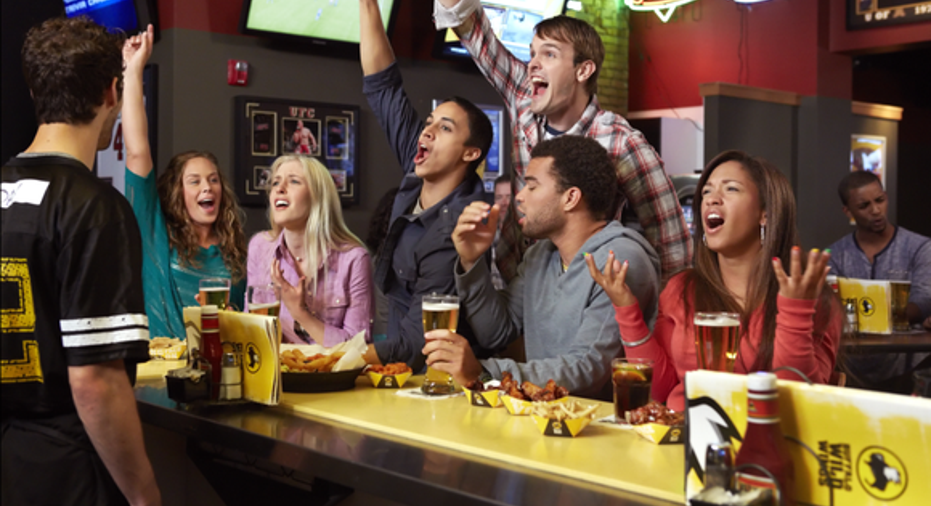Buffalo Wild Wings' Half-Priced Wings Could Pressure This High-Growth Competitor

Image source: Buffalo Wild Wings
After becoming a Wall-Street darling because of its torrid growth, Buffalo Wild Wings (NASDAQ: BWLD) has seen its stock price slide as growth as stagnated. On a one-year basis, shares have fallen approximately 20% versus the S&P 500's gain of 12.5%. When compared with its restaurant peers, Buffalo Wild Wings is still underperforming, albeit to a lesser degree, as restaurants have gained 5% during this time frame.
Buffalo Wild Wings early growth was made easier by the lack of true competitors in the investing space. Outside Buffalo Wild Wings, the chicken-wing market is quite fragmented, with many small-scale mom-and-pop wing spots and other large-scale competitors offering the dish to varying degrees of success. Last June, however, fast-casual competitor Wingstop (NASDAQ: WING) had its IPO at a price of $19; shares are up approximately 53% from its debut price. The largest reason for this divergence has been that Wingstop has continued to grow same-store sales while Buffalo Wild Wings has seen this figure fall throughout 2016.
Source: company financials.
The biggest difference between Buffalo Wild Wings and Wingstop from a business standpoint is the restaurant type. Buffalo Wild Wings is considered a casual restaurant with traditional table service, while Wingstop is a fast-casual eatery. With its newest moves, Buffalo Wild Wings is taking steps to blur the lines. Wingstop could be hit more than others in the event Buffalo Wild Wings is successful.
Buffalo Wild Wings is competing on price against fast-casual restaurants
The biggest difference between fast-casual and traditional restaurants is price. Fast-casual occupies mid-level of pricing, with prices more expensive than quick-service restaurants, or QSRs, such as McDonald's or Burger King. In 2014, the NPD group reported that the average ticket at QSRs totaled $5.30, versus $7.40 for fast-casual. Versus traditional casual restaurants such as Buffalo Wild Wings, however, which have an average ticket price of $13.66, NPD reports that fast-casual eateries are 46% cheaper.
Image source: Wingstop.
To compete on price, Buffalo Wild Wings is offering half-priced wings on Tuesdays. According to a research note from Morgan Stanley, this price drop has had an immediate impact on sales. Presumably, this deal could steal share from all restaurants, including fast casual, but it affects Wingstop to a larger degree, as it's a direct competitor with the same cuisine.
Buffalo Wild Wings is also competing with fast-casual on speed
A second advantage fast-casual has over casual restaurants is embedded in its name: fast. What's enabled the rise of fast-casual restaurants such as Chipotle Mexican Grill, Panera Bread, and Shake Shack are the quick turnaround times that allow the business crowd to dine there during lunch breaks. Buffalo Wild Wings, on the other hand, had taken the approach to leverage its sports-friendly dining experience over quick service. For many time-sensitive consumers, Buffalo Wild Wings was simply not an option.
A few months ago that changed, with the company offering a weekday 15-minute lunch guarantee. While that's still a little longer than the average fast-casual restaurant, Buffalo Wild Wings should be able to compete more effectively for the lunch daypart -- especially on Tuesdays, where BWW has a cheaper product with a better dining environment. Again, Wingstop could be particularly affected, as both its business model's advantage and food type are being replicated.
For Buffalo Wild Wings investors, it's good to see the company is being proactive at luring customers back, especially during the all-important football season. While neither of these initiatives appears to be aimed at the weekend sports crowd, weekday improvement should make it easier for the company to turn around its sagging same-store sales figures. Fast-casual CEOs, especially Wingstop's Charles Morrison, should watch Buffalo Wild Wings' new initiatives closely.
A secret billion-dollar stock opportunity The world's biggest tech company forgot to show you something, but a few Wall Street analysts and the Fool didn't miss a beat: There's a small company that's powering their brand-new gadgets and the coming revolution in technology. And we think its stock price has nearly unlimited room to run for early in-the-know investors! To be one of them, just click here.
Jamal Carnette owns shares of Wingstop. The Motley Fool owns shares of and recommends Buffalo Wild Wings, Chipotle Mexican Grill, and Panera Bread. Try any of our Foolish newsletter services free for 30 days. We Fools may not all hold the same opinions, but we all believe that considering a diverse range of insights makes us better investors. The Motley Fool has a disclosure policy.



















